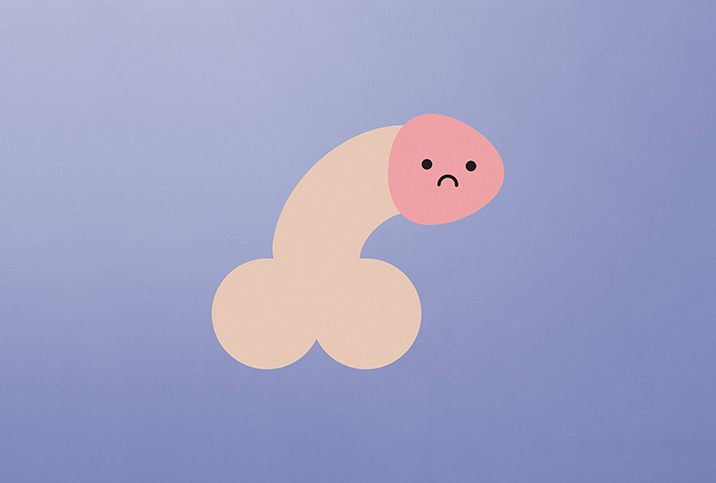Treatment of Mental Health Conditions and ED

The link between mental health and erectile dysfunction (ED) is strong, and it can create a vicious cycle in which they feed off each other. Mental health problems, such as anxiety, depression and stress, can lead to sexual health problems like ED, which can cause more anxiety about sexual performance, continuing the cycle and making ED more likely to occur.
How do you break the cycle? How important is your mental health to your sexual health?
An overview of mental health and ED
Erectile dysfunction is one of the most common sexual problems experienced by men. A widely cited statistic puts the number of U.S. men affected by ED at about 30 million. One 2016 survey that relied on self-reporting placed the number as high as 47.5 million. The landmark Massachusetts Male Aging Study (MMAS) of 1987-1989 placed the number at 52 percent of men from age 40 to 70 (any degree of impotence).
Defined as an inability to achieve or maintain an erection sufficient for satisfactory intercourse, ED can have many possible causes, both physiological and psychological. While your doctor can help treat the physical barriers to maintaining an erection during sex, addressing the mental factors can be more difficult.
Mental health problems that can trigger ED include anxiety, stress, depression and low self-esteem.
Anxiety
Anxiety can be both a cause and a symptom of ED. It can interrupt the messages from your brain that instruct the blood vessels in your penis to relax and allow adequate blood flow to maintain an erection. This, in turn, can lead to performance anxiety and fear of inadequate performance in bed, which can worsen erectile dysfunction.
Stress
Even moderate levels of stress can cause interruptions to normal sexual function. Stress works by preparing your body for action, in essence activating your "fight-or-flight" response. This means releasing cortisol into the bloodstream, which causes your blood vessels to constrict and decreases blood flow to areas of the body not needed for this response, such as the penis.
Depression
Depression affects how you feel about your life and how you function as a sexually active adult. It can lead to feelings of guilt, shame, indifference and apathy, and a lack of motivation and desire for sex. Bringing these feelings into the bedroom makes sexual performance more difficult and can easily lead to ED.
Low self-esteem
Your self-esteem has a direct impact on your sexual performance, and vice versa. A low opinion of yourself can lead to performance anxiety, making erectile dysfunction more likely.
When to see a doctor about ED
If you experience erectile dysfunction in more than half of your sexual encounters, it's time to talk to your doctor, who can provide you with information about how to overcome it and may recommend treatments including prescription drugs, counseling or therapy.
Your doctor is sure to ask several questions during the diagnostic process. The more openly and honestly you answer them, the more precise the diagnosis can be. If you don't share the symptoms with your doctor, you won't be able to receive the treatments for them
Are you taking any medication? Many drugs, prescription and over-the-counter, can affect sexual function. Your doctor will need to know which drugs you've taken recently to rule them out as a cause of ED.
Are you getting enough rest and exercise? Inadequate sleep and a sedentary lifestyle are significant risk factors in erectile dysfunction.
Are you smoking heavily or drinking excessively? Both cigarettes and alcohol are known to cause sexual dysfunction. Talk to your doctor about how quitting smoking and cutting back on alcohol can help your ED.
Medically treating mental health and ED
If you're diagnosed with ED, your doctor will want to talk about possible causes and solutions. Since mental health can be a factor, they will likely want to address your mental health first before recommending medical solutions to ED.
Medical treatments for mental health can include cognitive behavioral therapy (CBT), antidepressant or anti-anxiety medication, counseling and psychotherapy. Intervention for mental health can take a long time to have an effect, even with medication, so it's best to be patient and trust your healthcare providers.
Your doctor will also want to rule out any physiological factors that may cause erectile dysfunction, so be prepared for questions about your sexual activity, diet, exercise frequency and sleep patterns.
Naturally treating mental health and ED
Many options are available for self-help when it comes to your sexual and mental health. Lifestyle factors such as a fatty diet, a sedentary lifestyle, smoking, alcohol consumption and drug use can be significant triggers for both ED and mental health. A small change to any one of these factors can improve your self-esteem and self-confidence, which can boost your performance in bed and improve your sexual health.
Try replacing high-fat foods in your diet with more vegetables and antioxidants. Replace the burger with some fish high in omega-3 fatty acids, and skip the fries and order a green salad. Decrease the amount of over-processed foods such as bleached flour and white rice and load up on whole grains such as quinoa, whole-wheat bread and brown rice.
One of the leading physiological causes of ED is cardiovascular disease, which can reduce blood flow to various parts of the body, including the penis. Cardiovascular disease can be caused by hypertension, obesity and a lack of physical activity. The best way to treat this condition is to start an exercise regimen to improve your cardiovascular function. Something as simple as going for a 30-minute walk every day can significantly affect your mental and physical health. It has the added benefit of helping you lose weight and stay fit. Talk with your doctor before you begin any strenuous exercise routine.
The link between mental health, smoking cigarettes and ED is well documented. Nicotine causes blood vessels to constrict, which decreases blood flow and makes it more difficult for your heart to function normally. Though there is some evidence that cigarettes can increase testosterone levels in men, considerably more evidence suggests that cigarettes can affect sexual potency and contribute to ED.
Alcohol consumption has a significant effect on both mental and sexual health. Moderate consumption of alcohol may not have much of an impact, but if you're indulging in more than two or three drinks a day, you're at a much higher risk for sexual health problems such as erectile dysfunction. Cutting back to a few drinks a week can improve your physical and mental health.
How antidepressants impact ED
Your doctor might recommend medication to improve your mental health. Some antidepressants can impact your sexual desire or sexual performance as a side effect. If your medication lowers your sex drive, don't be afraid to talk to your partner and your doctor. You have options when it comes to your sexual and mental health.
Some common antidepressants known as selective serotonin reuptake inhibitors (SSRIs)—sertraline (Zoloft) and fluoxetine (Prozac) are popular SSRIs—can cause decreased sexual desire, decreased sexual excitement or even an inability to achieve orgasm. If you notice any of these undesirable side effects, talk to your doctor about changing your medication to a different SSRI or to a different type of antidepressant, such as NDRI (norepinephrine dopamine reuptake inhibitor) or bupropion (Wellbutrin). NDRIs work differently than SSRIs, and studies have shown less occurrence of sexual side effects.
If changing your medication isn't an option, you can try a more practical approach by engaging in sexual activity before taking your medicine, when the level of the drug is lowest in your body. You can also talk to your doctor about whether taking a break from your medication for a few days is a viable option.
How to manage performance anxiety
Performance anxiety is characterized by the fear that you are or will be unable to please your partner in bed. It's a widespread problem and both a cause and a symptom of ED. Performance anxiety can be caused by low self-esteem, poor body image, relationship stress, anxiety or fear of premature ejaculation (PE). The stress of performance anxiety can make it more difficult to get or maintain an erection, which, as discussed previously, continues the cycle of mental and sexual health problems.
If you're suffering from performance anxiety, the most important step to take is to communicate with your partner and your doctor. You may feel embarrassed or uncomfortable discussing your sexual health, but communication is the first step toward solving these problems. There are many ways to deal with performance anxiety.
An erection is stimulated by your parasympathetic nervous system, which functions behind the scenes and helps your body perform functions such as digest food. When performance anxiety kicks in, it overrides the arousal signals from your parasympathetic nervous system with feelings of fear or anxiety, and keeps an erection from occurring. You can manage performance anxiety by trying the following:
- Experiment with other ways of being intimate with your partner. Try to relax and enjoy sexual play outside of intercourse. Massage, foreplay and mutual masturbation are all excellent ways to add variety to your sexual experience.
- Try sex therapy with a trained professional. A therapist can help you talk about and work through any mental health issues contributing to performance anxiety or ED.
- Write down and talk through a sexual scenario with your partner. A written narrative can help you focus on what you enjoy about sex with your partner without the distractions that can lead to performance anxiety.
- Another approach to take in regard to performance anxiety or premature ejaculation is called paradoxical intention. Here, you can take the opposite attitude toward your symptoms; for example, I am going to orgasm as quickly as I can. By taking this approach, the pressure and anxiety are lessened.
The biggest hurdle to overcoming mental health issues and ED is overcoming the stigma of talking about them. Be open with your partner and your doctor, and see which treatment is right for you.


















